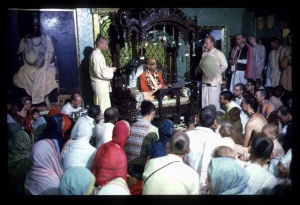CC Antya 9.13: Difference between revisions
m (1 revision(s)) |
No edit summary |
||
| Line 1: | Line 1: | ||
{{ | [[Category:Sri Caitanya-caritamrta - Antya-lila Chapter 09|C013]] | ||
<div style="float:left">'''[[Sri Caitanya-caritamrta|Śrī Caitanya-caritāmṛta]] - [[CC Antya|Antya-līlā]] - [[CC Antya 9|Chapter 9: The Deliverance of Gopīnātha Paṭṭanāyaka]]'''</div> | |||
<div style="float:right">[[File:Go-previous.png|link=CC Antya 9.12|Antya-līlā 9.12]] '''[[CC Antya 9.12|Antya-līlā 9.12]] - [[CC Antya 9.14|Antya-līlā 9.14]]''' [[File:Go-next.png|link=CC Antya 9.14|Antya-līlā 9.14]]</div> | |||
{{CompareVersions|CC|Antya 9.13|CC 1975|CC 1996}} | |||
{{RandomImage}} | |||
==== TEXT 13 ==== | ==== TEXT 13 ==== | ||
<div | <div class="verse"> | ||
eka-dina loka | :eka-dina loka āsi' prabhure nivedila | ||
gopīnāthere | :gopīnāthere 'baḍa jānā' cāṅge caḍāila | ||
</div> | </div> | ||
| Line 12: | Line 16: | ||
==== SYNONYMS ==== | ==== SYNONYMS ==== | ||
<div | <div class="synonyms"> | ||
eka- | ''eka-dina''—one day; ''loka''—people; ''āsi'' '—coming; ''prabhure''—to Śrī Caitanya Mahāprabhu; ''nivedila''—informed; ''gopīnāthere''—Gopīnātha Paṭṭanāyaka; ''baḍa jānā''—the eldest son of King Pratāparudra; ''cāṅge caḍāila''—was raised on the ''cāṅga''. | ||
</div> | </div> | ||
| Line 19: | Line 23: | ||
==== TRANSLATION ==== | ==== TRANSLATION ==== | ||
<div | <div class="translation"> | ||
One day people suddenly came to Śrī Caitanya Mahāprabhu and informed Him, | One day people suddenly came to Śrī Caitanya Mahāprabhu and informed Him, "Gopīnātha Paṭṭanāyaka, the son of Bhavānanda Rāya, has been condemned to death by the baḍa-jānā, the eldest son of the King, and has been raised on the cāṅga. | ||
</div> | </div> | ||
| Line 26: | Line 30: | ||
==== PURPORT ==== | ==== PURPORT ==== | ||
<div | <div class="purport"> | ||
The cāṅga was a device for killing a condemned person. It consisted of a raised platform on which the condemned was made to stand. Underneath the platform, there were stationary upright swords. The condemned man would be pushed down onto the swords, and in this way he would die. For some reason, Gopīnātha Paṭṭanāyaka had been condemned to death and had therefore been raised upon the cāṅga. | The ''cāṅga'' was a device for killing a condemned person. It consisted of a raised platform on which the condemned was made to stand. Underneath the platform, there were stationary upright swords. The condemned man would be pushed down onto the swords, and in this way he would die. For some reason, Gopīnātha Paṭṭanāyaka had been condemned to death and had therefore been raised upon the ''cāṅga''. | ||
</div> | </div> | ||
__NOTOC__ | |||
<div style="float:right; clear:both;">[[File:Go-previous.png|link=CC Antya 9.12|Antya-līlā 9.12]] '''[[CC Antya 9.12|Antya-līlā 9.12]] - [[CC Antya 9.14|Antya-līlā 9.14]]''' [[File:Go-next.png|link=CC Antya 9.14|Antya-līlā 9.14]]</div> | |||
__NOTOC__ | |||
__NOEDITSECTION__ | |||
Revision as of 11:50, 21 September 2021

A.C. Bhaktivedanta Swami Prabhupada
TEXT 13
- eka-dina loka āsi' prabhure nivedila
- gopīnāthere 'baḍa jānā' cāṅge caḍāila
SYNONYMS
eka-dina—one day; loka—people; āsi '—coming; prabhure—to Śrī Caitanya Mahāprabhu; nivedila—informed; gopīnāthere—Gopīnātha Paṭṭanāyaka; baḍa jānā—the eldest son of King Pratāparudra; cāṅge caḍāila—was raised on the cāṅga.
TRANSLATION
One day people suddenly came to Śrī Caitanya Mahāprabhu and informed Him, "Gopīnātha Paṭṭanāyaka, the son of Bhavānanda Rāya, has been condemned to death by the baḍa-jānā, the eldest son of the King, and has been raised on the cāṅga.
PURPORT
The cāṅga was a device for killing a condemned person. It consisted of a raised platform on which the condemned was made to stand. Underneath the platform, there were stationary upright swords. The condemned man would be pushed down onto the swords, and in this way he would die. For some reason, Gopīnātha Paṭṭanāyaka had been condemned to death and had therefore been raised upon the cāṅga.